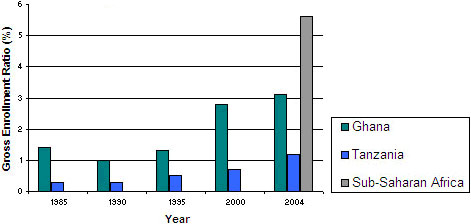Widening Participation in Higher Education in Ghana and Tanzania: Developing an Equity Scorecard
Introduction
There is a political economy of access and participation in higher education. Higher education is repeatedly positioned by the international community as a central site for facilitating the skills, knowledge and expertise that are essential to economic and social development in low-income counties. However, globally, there are concerns about who gains access to higher education and whether some socio-economic groups are persistently marginalised. In Sub-Saharan Africa, less than 6 per cent of the population is enrolled in higher education.
 Access to higher education in Ghana and Tanzania is rising but remains low. In 2004, both countries had Gross Enrolment Ratios that were lower than the average for Sub- Saharan Africa, and other countries with similar levels of (low) income: Ghana (3.1%) and Tanzania (1.2%)
Access to higher education in Ghana and Tanzania is rising but remains low. In 2004, both countries had Gross Enrolment Ratios that were lower than the average for Sub- Saharan Africa, and other countries with similar levels of (low) income: Ghana (3.1%) and Tanzania (1.2%)
This project has examined patterns of inclusion and exclusion in higher education in Africa to interrogate the role that universities play in poverty reduction and achievement of the Millennium Development Goals. Working with a public university and a private university in Ghana and Tanzania, the project has developed Equity Scorecards to measure inclusion and achievement of socially and economically excluded groups in the case study institutions. In the longer term, these scorecards will enable institutions to continue to measure how well they are doing in terms of widening participation in higher education.
The project's aims were:
- To explore the role that universities are playing in poverty reduction programmes
- To provide information about how higher education is contributing to Millenium Development Goals
- To build theory about socio-cultural aspects of higher education in low-income countries
- To contribute to making higher education more socially inclusive
- To provide a comprehensive statistical overview of patterns of participation and achievement in higher education in Ghana and Tanzania.
- To provide illuminatory qualitative data that will help explain statistical data and provide more textured information about enablers and barriers to participation and achievement for under-represented groups in higher education
- To devise Equity Scorecards to evaluate the effectiveness of existing policy interventions to promote inclusion in the case study institutions
- To enhance research capacity in the partner countries
- To produce new literature on the subject of widening participation in higher education in low-income countries
The MDGs:
- Eradicate extreme poverty and hunger
- Achieve universal primary education
- Promote gender equality and empower women
- Reduce child mortality
- Improve maternal health
- Combat HIV/AIDS, malaria and other diseases
- Ensure environmental sustainability
- Develop a global partnership for development
(source: United Nations website)
For more information on the Widening Participation Project in Ghana and Tanzania, download our leaflet - about us [PDF 358.39KB]


